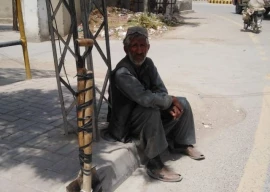1732513395-0/Copy-of-Untitled-(75)1732513395-0.png)
Ongoing protests and road closures in Islamabad and Rawalpindi have led to the postponement of court hearings, with cases being adjourned without proceedings.
Due to Pakistan Tehreek-e-Insaf (PTI) protests, heightened police presence, and blocked roads, authorities were unable to transfer detainees from Adiala Jail to local courts on Monday, according to reports from Express News.
The police’s extensive security duties meant detainees scheduled to appear in court could not be transported to sessions in Islamabad and Rawalpindi.
With no detainees present, several ongoing cases in the civil and sessions magistrate courts of the twin cities were adjourned without hearings, and new dates are being issued for postponed cases.
In response, the president of the High Court Bar stated that defendants and plaintiffs would not face repercussions for non-appearance in court due to road closures. A formal application has been submitted to both the high court and district court, detailing that roadblocks have prevented clients from reaching court premises.
A jail police guard confirmed that Adiala Jail would not be transferring any detainees for court appearances, while local courts continued to issue new dates for cases without proceeding with scheduled hearings.
The disruptions come as security measures and widespread road closures persist across the capital and Rawalpindi due to protests, impacting judicial operations and access to court services across both cities.
Moreover, roadblocks and restrictions at entry and exit points to Lahore and other cities has caused significant disruptions in the supply chain, leading to an alarming increase in the prices of perishable goods, particularly fruits and vegetables.
The transportation of essential commodities to the provincial capital was severely hampered, creating shortages and raising prices to unprecedented levels. While the district administration reflected only a minimal impact of the supply distortions in its official price lists, the ground realities told a different story as more than 100 per cent overcharging on essential perishable items was observed on Sunday.
Vendors openly disregarded official price lists, citing the inability to source goods due to transportation restrictions.
Farmers were forced to leave their produce in the fields as transporting goods to the city became nearly impossible, with roadblocks making it difficult for them to recover even basic costs.
The well-publicised restrictions not only disrupted the supply chain but also discouraged agricultural producers from lifting their harvests, exacerbating the shortage of fresh produce in urban markets across Punjab.
The impact of the crisis was evident in the surging prices of essential commodities.
The disconnect between official price lists and market rates left consumers frustrated, as they struggled to afford basic necessities.
The vendors, citing transportation challenges and dwindling supplies, justified the inflated prices.


1723278472-0/BeFunky-collage-(4)1723278472-0-165x106.webp)



1732530440-5/Copy-of-Untitled-(85)1732530440-5-270x192.webp)

1732525382-0/Express-Tribune-(10)1732525382-0-270x192.webp)

1732523977-0/Copy-of-Untitled-(82)1732523977-0-270x192.webp)










COMMENTS
Comments are moderated and generally will be posted if they are on-topic and not abusive.
For more information, please see our Comments FAQ